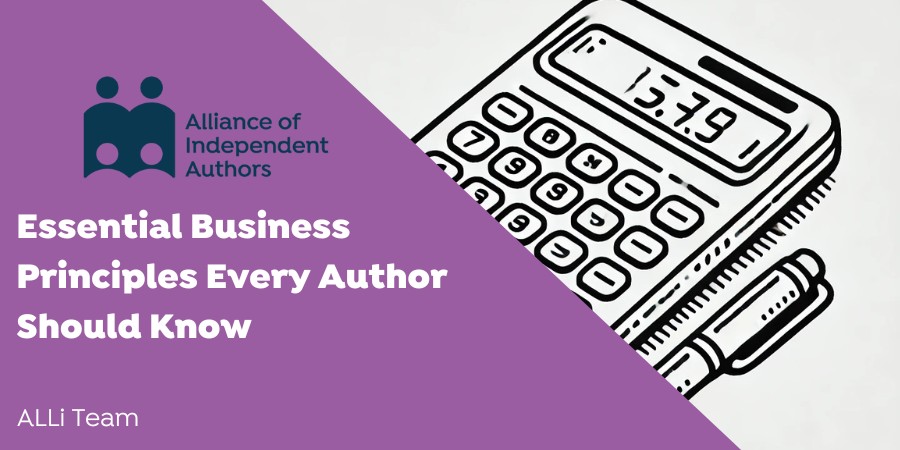Authors who sell books are running publishing ventures, whether they realize it or not, and understanding fundamental business principles can mean the difference between long-term sustainability and costly mistakes.
Many authors begin their careers focused solely on writing, only to discover the financial and operational challenges of running an author business. Pricing decisions, tax obligations, marketing strategies, and administrative tasks all play a role in a successful publishing career. Without a solid grasp of these basics, authors may struggle to turn their work into a viable business.
A strong foundation in business concepts can help authors make informed decisions, avoid common pitfalls, and build sustainable careers in publishing.
Understanding Goals as an Author
Every independent author approaches publishing with different goals. Some write for personal fulfillment, while others aim to supplement their income or build a full-time career. Understanding these objectives early can help shape business decisions, from pricing strategies to marketing efforts.

Rick Waugh
Author Rick Waugh emphasized the importance of defining these goals.
“Most important thing is to understand your goals, and set them. What do you want from your writing? Just to write fun stories? Make a little cash? Make a living? Because the one thing new writers seem to miss is that once you’ve decided you want to sell books, you’ve gone into business, and it’s a great idea to understand the market, what’s selling, and why. Doesn’t mean that every decision needs to be about profit, but you need to consider what you’re doing and how it supports those goals.”
Recognizing that publishing is a business from the moment a book is for sale can help authors make strategic choices that align with their objectives. Those seeking to make a full-time income will need to approach publishing differently than those writing as a hobby. Whether the goal is to break even, generate passive income, or build a brand, a clear understanding of the intended outcome allows for better planning and decision-making.
Key Business Concepts
Authors who treat their writing as a business from the beginning are better positioned for long-term success. This includes financial planning, tracking income and expenses, and understanding how tax laws apply to publishing.
One widely recommended approach to financial management is the Profit First method, which prioritizes setting aside profit before covering expenses. By ensuring that income is allocated wisely, authors can avoid common financial pitfalls and build a sustainable business. Keeping detailed records of earnings and expenditures is essential, whether through accounting software, spreadsheets, or professional bookkeeping services.

Judy L. Mohr
Author Judy L. Mohr highlighted the importance of thinking of writing as a business from the start.
“It’s a long list of things that I wish I knew before I started down this venture. One aspect that is relevant regardless [of] what publication path one takes is that we are all ‘business owners’ and we should think of the financial side of things like that from day one. Writers are hesitant to think of it that way, but if you remind writers that any money we’ve spent on courses, conferences, workshops, and writer resources are all classified as a business expense. And because they are a business expense, one is able to accumulate losses on their taxes in most countries.”
For those pursuing publishing as a career, understanding tax deductions can make a significant difference in financial planning. Expenses related to writing, such as software, website hosting, and marketing, may be deductible depending on local tax laws. In some countries, accumulated losses can offset future earnings, reducing tax liability as an author’s business grows. Seeking advice from a tax professional can help ensure compliance and maximize available deductions.
By approaching writing with a business mindset, authors can set themselves up for financial stability and avoid costly mistakes down the road.
Business Structure: Do You Need an LLC?
One of the first business decisions an author may consider is whether to operate as a sole proprietorship or form a limited liability company (LLC). A sole proprietorship is the simplest structure—an individual running a business without legal separation between personal and business assets. An LLC, on the other hand, is a legal entity that provides liability protection, meaning personal assets are generally protected if the business is sued or accrues debt.
For some authors, forming an LLC makes sense, particularly for those who generate significant income, plan to collaborate with others, or want to establish a clear distinction between personal and business finances. However, an LLC is not required to publish books, and for many, a sole proprietorship is sufficient.
One key financial consideration is maintaining a separate business bank account, regardless of business structure. Keeping personal and business finances separate simplifies bookkeeping, tax preparation, and financial planning. Many authors also use a business account to process payments from book sales, particularly at in-person events or through direct sales platforms.
Taxes
Understanding tax obligations is a critical aspect of running a publishing business. While tax laws vary by country and state, authors selling books—particularly at in-person events—may be responsible for collecting and remitting sales tax.

Cristy Robinson
Author Cristy Robinson highlighted the challenges of navigating sales tax at book events.
“Sales tax for in-person book events. I sold books up in Michigan, and the organizer didn’t have an easy sales tax reporting form and payment mechanism at the end like some others I’ve done. You have to register in the county and state and file reports (choose annual to make it easy on yourself). And even if it’s $0, it has to be filed. So, choose your in-person book events wisely. Also, you need a way to take payments, and that only works if you’re operating as a business. I have an LLC with its own bank account, and I use Square. That all can be a minefield for authors who don’t know the business lay of the land.”
Author Walter Boomsma emphasized the importance of understanding state-specific tax laws, noting that in many states, authors who sell books and accept payments—whether individually or through an LLC—are responsible for collecting and reporting sales tax. He recalled instances where state auditors attended events to verify that vendors were properly registered. Because many authors may be unaware of their tax obligations, he advised consulting a tax professional to ensure compliance.
Because tax laws can be complex and vary widely, seeking guidance from a tax professional can help authors remain compliant and avoid penalties. This is particularly important for those selling books across multiple states or internationally.
Marketing and Branding as a Business Strategy
Establishing a strong online presence is an essential part of running a publishing business. A website serves as a hub for an author’s brand, providing a space for readers to learn more about books, sign up for newsletters, and engage with the author’s work beyond social media.
Author Robert Holland emphasized the value of a website not just for marketing, but also for strengthening a book’s online visibility.
“A single-member limited liability corporation (LLC) can have its own website, which is a form of marketing. It's also a place on the internet to link your book's website to—and Google likes links—which can also be used as the Publisher's Imprint.”
Beyond an online presence, networking and relationship-building play a crucial role in discoverability. Connecting with readers, fellow authors, and industry professionals can open opportunities for collaborations, promotions, and long-term audience growth.
Outsourcing Tasks: When and Why?
Running an author business involves many tasks beyond writing, from editing and book formatting to cover design and marketing. While some authors prefer a hands-on approach, others find that outsourcing certain tasks allows them to focus on writing while ensuring a professional-quality product.
Hiring professionals for cover design, editing, and marketing services can be an investment in a book’s success. Virtual assistants (VAs) can also help with administrative work, such as managing social media, scheduling promotions, and responding to reader inquiries. Outsourcing can be particularly beneficial for authors who lack expertise in specific areas or find that business tasks take up too much of their creative energy.
The Hidden Time Cost of Running an Author Business
Beyond financial considerations, publishing requires a significant investment of time. Marketing, administrative tasks, and long-term audience engagement all demand attention, often pulling authors away from writing.
Author Meg Lewis described the balancing act between creative work and business responsibilities.
“All of these things are necessary, but definitely suck my available brain power away from actually sitting down and creating characters, worlds, and stories, which is what I'd love to be able to focus all my time on.”
Understanding that publishing is not just about writing, but also about managing a business, can help authors set realistic expectations and make informed decisions about where to focus their time and resources.
Final Thoughts: Treating Writing Like a Business from Day One
Approaching writing as a business from the beginning can help authors avoid common financial and legal pitfalls. While creativity remains at the heart of publishing, understanding the business side ensures that authors can sustain their careers and make informed decisions.
Even without an LLC, seeking professional financial advice can be beneficial. Author Sharon Hague noted the advantages of working with an accountant.
“Joanna Penn did mention setting up one's writing as a business from the beginning. Wise advice! We are in business from the moment of publication. My suggestion is, even if an author does not have an LLC, it makes sense to have an accountant. The respect accorded to people with them is much higher than to those without—especially from any tax department. And there are also perks, such as filing extensions.”
Mistakes are inevitable, but early awareness of business fundamentals can prevent costly missteps. Whether it’s tracking expenses, understanding tax obligations, or developing a marketing strategy, treating writing as a business allows authors to build a foundation for long-term success. Learning these principles early helps authors navigate challenges with confidence and focus more on what matters most—creating and sharing their work.
Thoughts or further questions on this post or any self-publishing issue?
 If you’re an ALLi member, head over to the SelfPubConnect forum for support from our experienced community of indie authors, advisors, and our own ALLi team. Simply create an account (if you haven’t already) to request to join the forum and get going.
If you’re an ALLi member, head over to the SelfPubConnect forum for support from our experienced community of indie authors, advisors, and our own ALLi team. Simply create an account (if you haven’t already) to request to join the forum and get going.
Non-members looking for more information can search our extensive archive of blog posts and podcast episodes packed with tips and advice at ALLi's Self-Publishing Advice Center.




